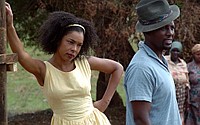 MUST
MUST  SEE
SEE
scr Helen Crawley, Jessie Keyt, Helena Kriel
prd Anthony Fabian, Genevieve Hofmeyr, Margaret Matheson
with Sophie Okonedo, Sam Neill, Alice Krige, Tony Kgoroge, Ella Ramangwane, Hannes Brummer, Faniswa Yisa, Nomhle Nkyonyeni, Ruaan Bok, Kate-Lyn Von Meyer, Bongani Masondo, Terri Ann Eckstein
release US Nov.08 afi; UK 24.Jul.09
08/South Africa 1h47

Stand by your man: Okonedo and Kgoroge



TORONTO FILM FEST
 Based on a true story, his powerful drama tells an important story from Apartheid-era South Africa with honesty and real sensitivity. And the cast makes it thoroughly gripping by never playing it safe.
Based on a true story, his powerful drama tells an important story from Apartheid-era South Africa with honesty and real sensitivity. And the cast makes it thoroughly gripping by never playing it safe.
In 1965, the Laing family is caught in a loophole of the 1950 law prohibiting South Africans from living or studying with people of another racial group. The problem is that Sandra (Ramangwane then Okonedo) looks more black than her white parents Abraham and Sannie (Neill and Krige). Treated horribly by teachers in her all-white school and abused by strangers, The Laings go to court to officially classify Sandra as white. But this has repercussions when she falls in love with a black man (Kgoroge) and can't legally live with her husband or children.
This is an extremely complex story about identity, looking at a woman caught between two groups in a harshly divided society. By focussing so tightly on the characters, the film is able to make vital points without ever preaching. Sandra naturally identifies more with the blacks, perhaps because they don't ooze with hatred toward her, which puts her at odds with her parents, especially Abraham. And his intractability adds another powerful layer to the film, as Sannie's loyalty to her husband conflicts horribly with her motherly instincts.
As a result, Krige has the film's most involving role, and she plays it with a delicate restraint that simply breaks our heart. Right to the bitter end, as South Africa's first free elections are held in 1994, Krige brings a remarkably raw dignity to her performance. Meanwhile, Okonedo plays Sandra with an inner fire that's both subtle and insistent. She also finds strong chemistry with Kgoroge which, as it develops into something much darker, makes the film even more provocative. And Neill bravely takes on the most unlikeable character without blinking.
Director Fabian fills the frame with telling details, such as Abraham quietly refusing to touch cash paid by black customers in his shop. This silent racism is as devastating as the more horrific events that come later. And these touches helps the film get deep beneath the surface of Apartheid, exploring attitudes of superiority that fuelled what the whites felt was a warranted prejudice. Seen today, this everyday cruelty and oppression is both inhuman and indefensible. And not as uncommon as we'd like to think.
 |
themes, violence, language | 16.May.09 |

 Still waiting for your comments ... don't be shy.
Still waiting for your comments ... don't be shy.
HOME | REVIEWS | NEWS | FESTIVAL | AWARDS | Q&A | ABOUT | TALKBACK